The DH4300 Plus is somewhat unexpected in UGREEN’s 2024-debut NASync family. The accessories maker quietly released it in late July, initially in the EU, as, for now, the sole server in the DH series, designed for mainstream users.
Rumor has that there’s a 2-bay version, model DH2300, on the way.
Although the new server has less powerful hardware specifications than the DXP lineup, represented by the DXP6800 Pro, it still has enough capabilities to somewhat rival the Synology DS925+ in general usage. After all, the two share the same 2.5Gbps connection grade.
Here’s the bottom line: If you’re looking for a server that meets your essential network-attached storage needs, the DH4300 Plus offers excellent value compared to the more expensive DS925+. The support for third-party drives alone is compelling enough. Consider one today!
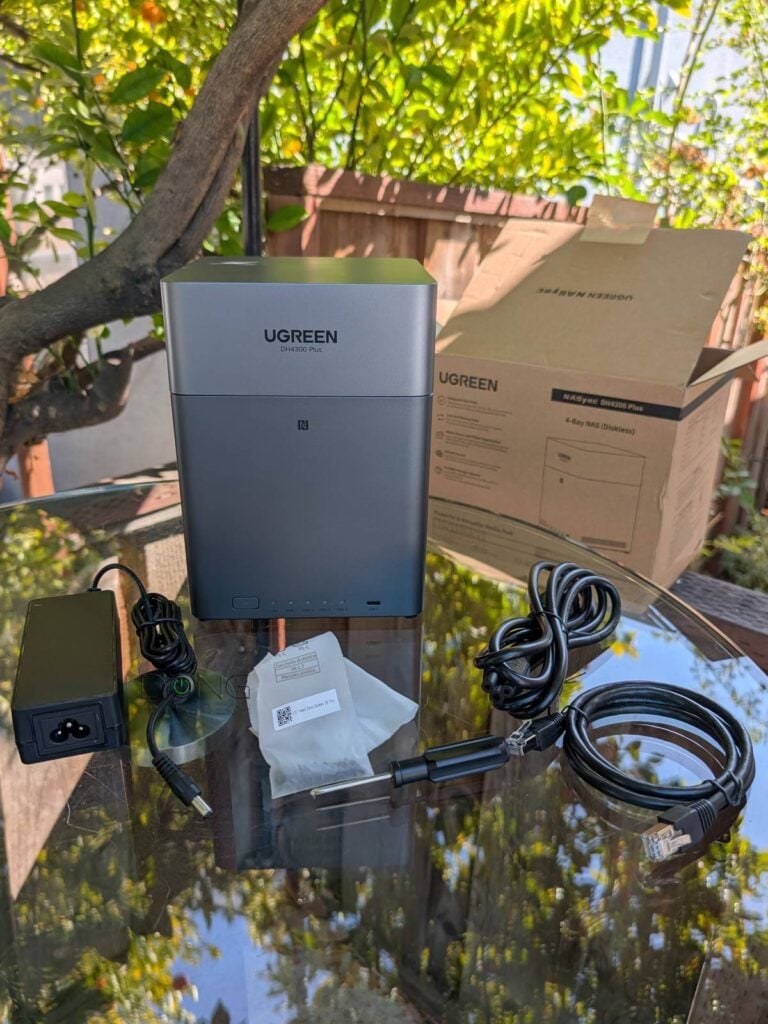
UGREEN NASync DH4300 Plus: A solid NAS server with some minor design flaws
Out of the box, the UGREEN NASync DH4300 Plus is a totally different machine compared to any servers in the DXP series, or any of the most popular NAS servers for that matter.
Its four drive bays are top-facing, similar to a toaster oven, rather than the traditional front-facing design. Each bay comes with a drive tray that holds a SATA drive of either a 3.5-inch or 2.5-inch standard, and you can lock the tray in place or remove it relatively easily via two latches on the sides. After that, a lid covers the entire top part, transforming the server into a fancy-looking rectangular box.
The idea is quite simple, but UGREEN’s approach could use some improvement.
My first issue is the top cover. It fits snugly and flushes in all sizes, giving the impression that it’s part of the server itself. This makes you feel like you can grab onto it to lift the server, which would also be the most convenient way to do so, the only way, in fact, if you wanted to use one hand for the job. However, it’s not securely locked to the server’s body in any way; instead, it simply rests on top, like a pot lid covering a third of the drive tray in depth. As a result, you might accidentally topple the server when intending to move or pick it up.


The second issue is that the drive trays differ significantly from those of the DXP6800 Pro or Synology servers—they are not tool-free. Instead, you’ll need to use tiny screws to attach a drive to a tray: six screws for each standard 3.5-inch hard drive or four for each 2.5-inch drive.
As you can imagine, this type of design makes setting up the hardware or replacing a drive quite tedious and time-consuming. Among other things, you first have to gather a fitting screwdriver for the job. What’s more, these tiny screws are form-fitting, meaning you can’t use just any standard ones of the same size and thread type.
The server comes with two bags of them, one with 26 pieces for 3.5-inch drives and the other with 18 smaller pieces for 2.5-inch drives, enough for all four drive trays with a couple to spare. But considering how small these things are, it’s very easy to lose them. In fact, I believe I misplaced a few during the testing process.
Other than that, the included magnetized screwdriver proved helpful during the setup process, allowing me to get the server with all four drives up and running—to the point where I could start building a RAID configuration—in about half an hour.
Single 2.5Gbps port with no upgrade options
The UGREEN NASync DH4300 Plus comes with a single 2.5Gbps LAN port on the back, with no upgrade options available to users. That’s because it’s powered by a system-on-chip consisting of a Rockchip ARM 8 Cores 2.4GHz CPU, 8GB of DDR4 RAM, and 32GB of flash, all part of the motherboard itself.
Unlike other NAS servers, the DH4300 Plus offers no option to have more than 8GB of RAM, nor can you add a faster network card, increase internal storage, or utilize NVMe SSDs. The only thing flexible is the storage you can add via native drive bays and three USB ports.
The lack of upgrade options, particularly on the system memory front, makes the server unsuitable for heavy multitasking or running specific applications, such as virtual machines. Perhaps this is why the DH4300 Plus, unlike previous UGREEN NAS servers, lacks support for VMs.
That said, compared to the DS925+, the UGREEN NASync DH4300 Plus lags in terms of hardware design and upgradeability and, therefore, real-world capability, but only for advanced network storage needs. For general usage, it’s powerful enough.


The table below shows hardware specs of the two competing servers in detail, with the UGREEN DXP6800 Pro as a reference.
UGREEN DH4300 Plus vs. Synology DS925+: Hardware specifications
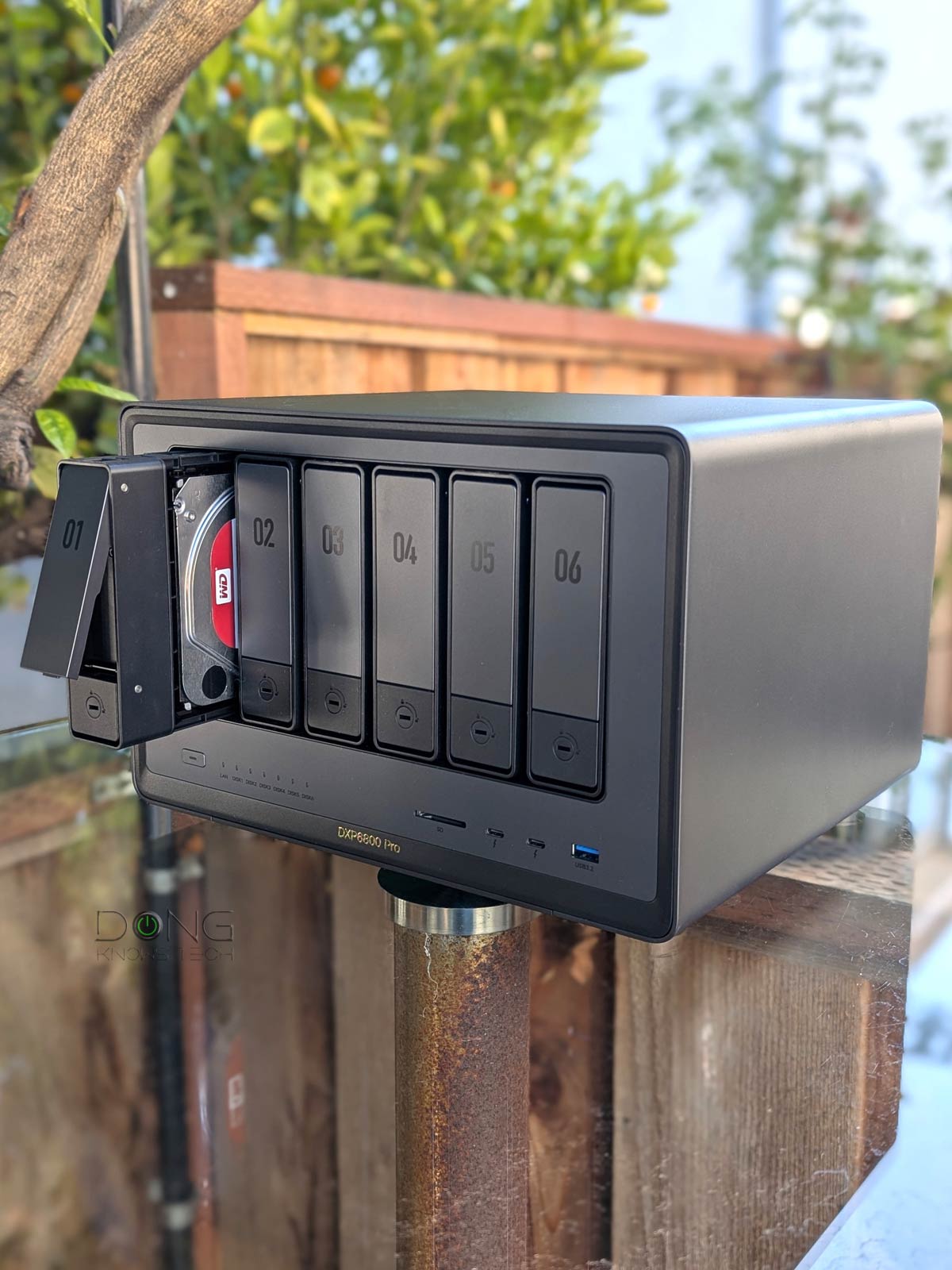 | 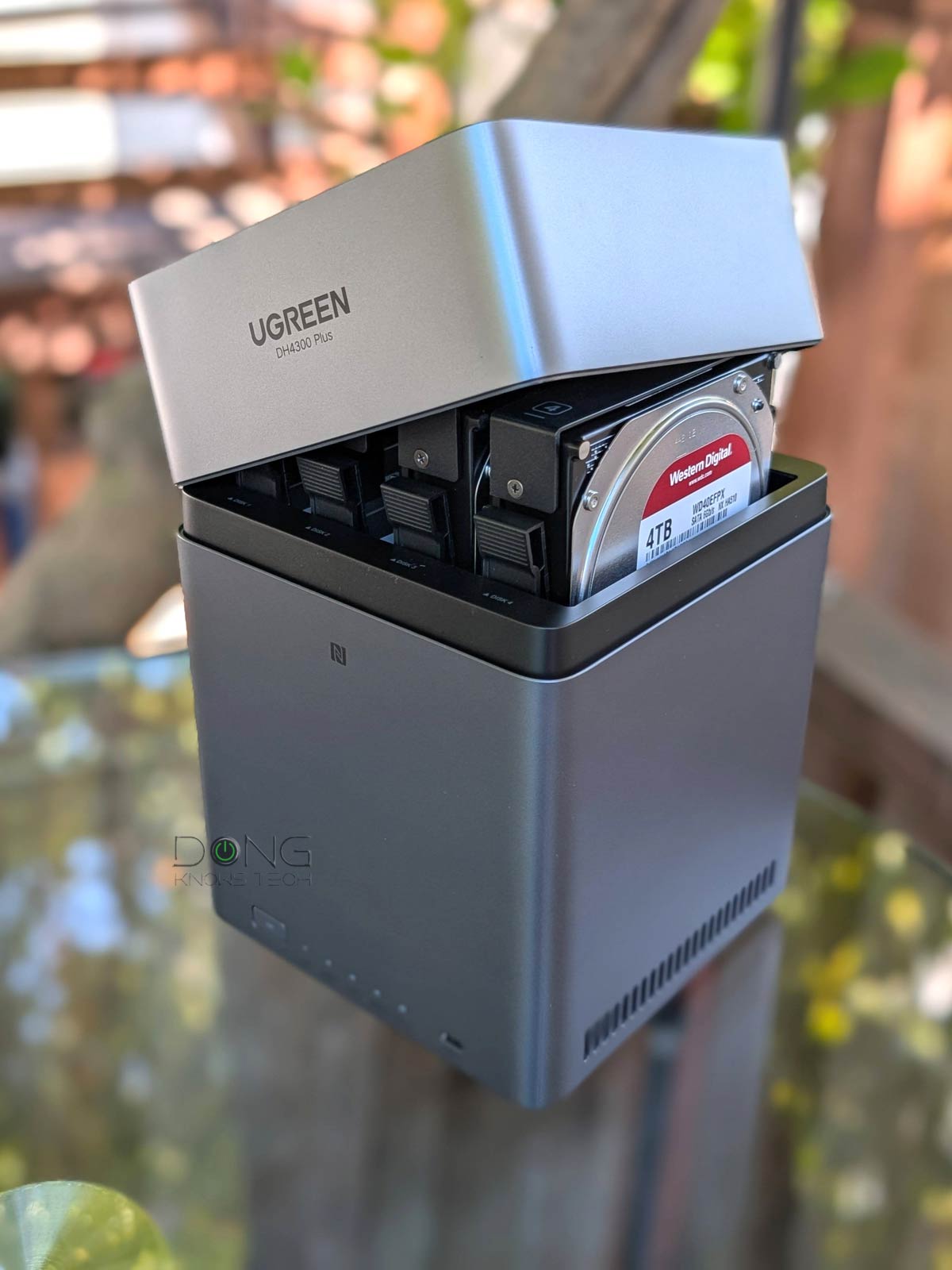 | 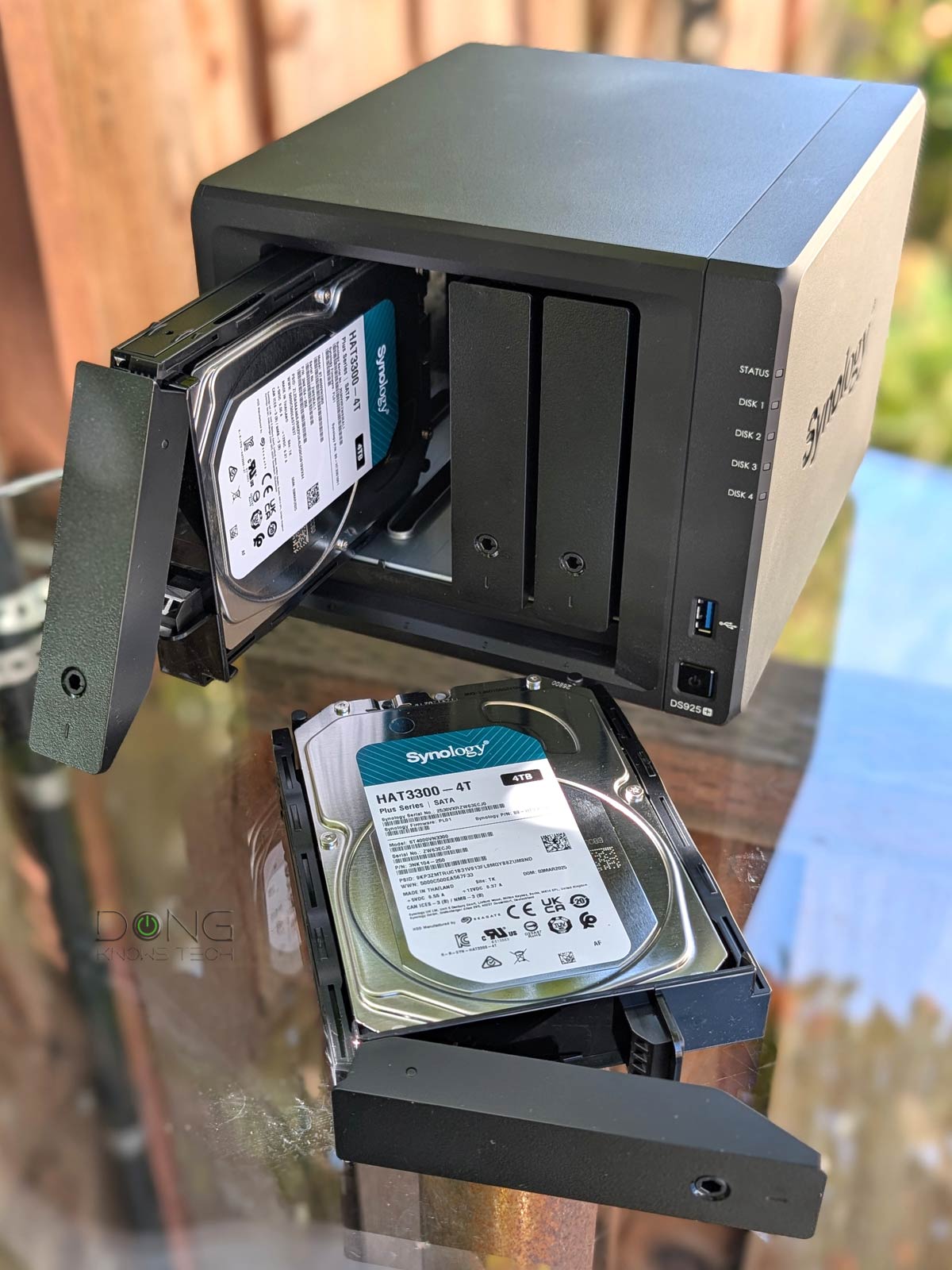 | |
|---|---|---|---|
| Model | UGREEN NASync DXP6800 Pro | UGREEN NASync DH4300 Plus | Synology DS925+ |
| CPU | Intel Core i5-1235U Processor 12M Cache, up to 4.40 GHz, with IPU | Rockchip RK3588 ARM 8 Cores 2.4GHz | AMD Ryzen V1500B Quad-core 2.2 GHz, 4 Cores / 8 Threads |
| System Memory | 8GB DDR5 (installed in one of the two memory slots) | 8GB DD4 (onboard) | 1x 4 GB DDR4 (installed in one of the two memory slots) |
| Max Memory | 64GB via two RAM slots (32GB x 2) | 8GB | 32GB (16GB x 2) |
| Built-in Storage | 128GB SSD (OS only) | eMMC 32GB (OS only) | None |
| Dimensions | 16.5 x 14 x 10.75 in (41.91 x 35.56 x 27.31 cm) | 6.1 x 6.1 x 8.49 in (15.5 x 15.5 x 21.57 cm) | 6.53 x 7.83 x 8.78 in (16.6 x 19.9 x 22.3 cm) |
| Weight (no storage) | 17.81 lbs (8.07 kg) | 3.97 lbs (1.8 kg) | 4.98 lbs (2.26 kg) |
| Drive Bays (native) | 6 | 4 | |
| Expansion Support | No | Yes (1x USB-C-based DX525) | |
| Drive Interface | SATA 6Gbps/3Gbps (hot-swappable) | ||
| Built-in M.2 Slots (NVMe) | Two | None | Two |
| Drive Support | 3.5″ SATA HDD 2.5″ SATA SSD/HDD M.2 2280 NVMe SSD (cache & storage) | 3.5″ SATA HDD 2.5″ SATA SSD/HDD | 3.5″ SATA HDD 2.5″ SATA SSD/HDD M.2 2280 NVMe SSD (cache & storage) |
| Max Raw Storage (via available HDDs) | 214TB (6x 30TB HDDs + 2x 8TB NVMe SSDs) | 120TB (4x 30TB) | Native bays: 80TB (4x 20TB) With expansion: 180TB (9x 20TB) |
| Storage Restriction | None (third-party drives allowed) | Synology HCL enforced | |
| RAID Types | Basic, JBOD, RAID 0, RAID 1, RAID 5, RAID 6, RAID 10 | Basic, JBOD, RAID 0, RAID 1, RAID 5, RAID 6, RAID 10 | Hybrid RAID (SHR), Basic, JBOD, RAID 0, RAID 1, RAID 5, RAID 6, RAID 10 |
| Max Volume Size (up to) | 214TB | 120TB | 200TB |
| Max IP Cameras Support | None | 40 (Two licenses included for non- Synology cameras) | |
| Virtual Machines | 8 | None | 8 |
| Ports | 2x RJ-45 10GbE LAN, 2x Thunderbolt 4, 2x USB 3.2, 2x USB 2.0, 1x HDMI 8K, 1x SD 4.0 slot | 1x RJ-45 2.5GbE LAN, 1x USB-C (USB 3.2 Gen 2), 2x USB-A (USB 3.2 Gen 2) | 2x RJ-45 2.5GbE LAN, 2x USB-A (USB 3.2 Gen 1), 1x USB-C (USB 3.2 Gen 1 for expansion only) |
| Add-on card | 1x PCIe Gen4x4 | None | |
| DiskStation Manager (operating system) | UGOS Pro | DSM 7.x | |
| OS Version (at testing) | 1.0.0.1708 | 1.8.11.0048 | 7.2.2.72806 |
| File System (native) | Btrfs, EXT4 | ||
| Power Consumption (per 24 hours) | ≈ 785 Wh (tested with six 3.5-inch hard drives) | ≈ 600 Wh (tested with four 3.5-inch hard drives) | ≈ 730 Wh (tested with four 3.5-inch hard drives) |
| Warranty | 3 years | 2 years | 3 years |
| US Launch Price (Compare street prices!) | $1199.99 | $429.99 | $700 |




Standard setup process and management
The DH4300 Plus shares a similar setup process as most NAS servers: via its IP address. You can find out this address from your network’s router. Next, open it in a browser like Chrome, and you’ll be guided through a few steps to get the router up and running.
If you don’t want to find out the IP address manually, you can use the downloadable UGREEN NAS application, which will automatically find the server in the network and launch the web interface for you.
As the server has built-in internal storage to host the operating system, you can set it up without a drive. However, to actually use it in a meaningful way, you need at least one drive in one of its drive bays. Ideally, you want to use all four to create a RAID configuration.
In this case, keep in mind that you need drives of the same capacity with sufficient long-term storage, as the server only supports standard RAID setups. That means scaling up storage requires backing up data and replacing all drives. The only wiggle room you have is starting with two drives in RAID 1, then later adding two more and migrating to RAID 5 without losing data.
It’s also worth noting that the server takes a long time to build a RAID, which is generally the case with standard RAID setups. For example, in my case, it took around 7 hours to finish building a RAID 5 out of four 4TB hard drives.
Once the setup is complete, you can go back to the IP address anytime to manage the server via its web-based user interface.
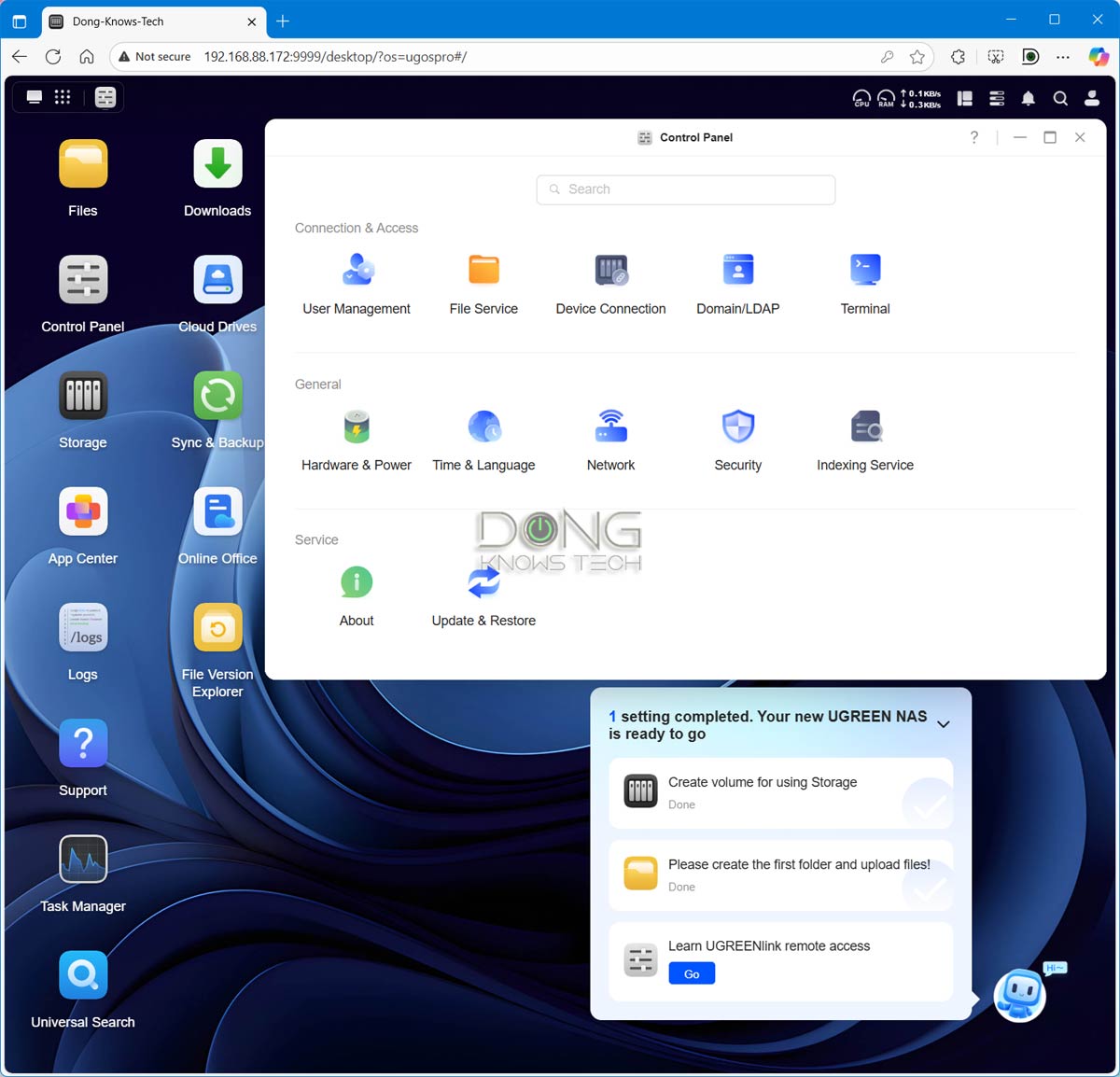
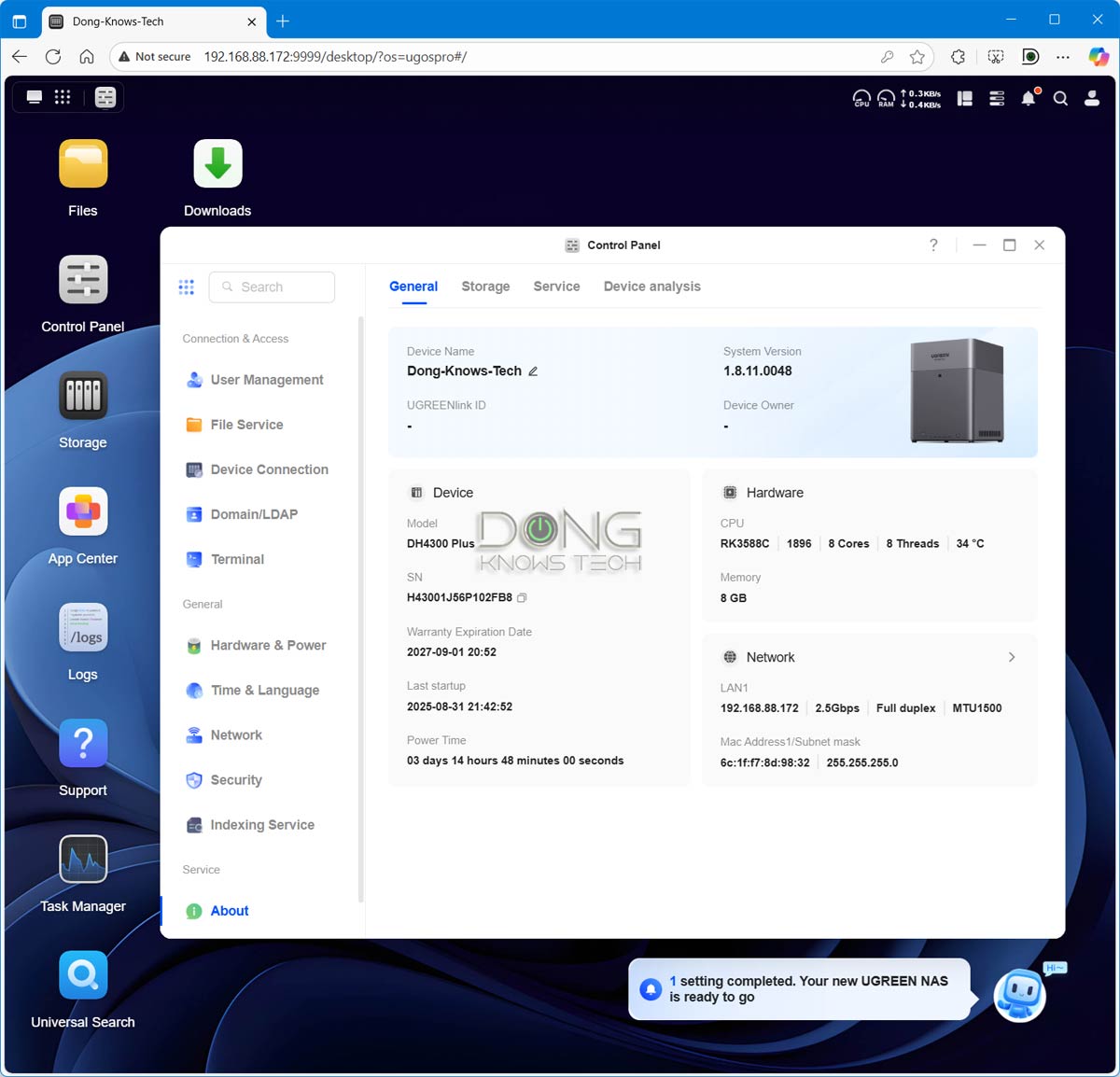
The now familiar UGOS Pro operating system, with its relatively modest app store
Like the DXP6800 Pro, the DH4300 Plus runs the same Linux-based operating system called UGOS Pro. Since I reviewed the former almost a year ago, this operating system has evolved quite a bit and is currently at version 1.8.x.
I tested the DXP6800 Pro at version 1.0.x. The latest builds are available to all UGREEN servers via free updates.
Still, things remain the same for the most part. The first thing to note is that the number of apps in the App Center hasn’t changed significantly. Generally, here is what you can expect:
- Essential network storage functions, including:
- RAIDs, volume, and pool management via the Storage app.
- File sharing and shared folders via the File Manager app.
- OS updates, hardware management, user accounts, Domain/LDAP integration, etc. via Control Panel.
- Built-in remote access via UGREENlink (similar to Synology’s QuickConnect) or Dynamic DNS.
- For data safety:
- Time-based versioning via the Snapot app (similar to Snapshot and Replication of Synology).
- Change-based training via File Version Explorer.
- Data encryption via Vault. There’s no volume-based encryption.
- For data sharing and backup:
- Sync and Backup app: sync and backup data between clients and NASync server, similar to Synology Drive.
- Online backup to a third-party service, such as OneDrive or Google Drive, via the Cloud Drives app.
- For entertainment and productivity
- Online Office: A suite of online word processing and spreadsheet software similar to Google Docs and Synology Office.
- Music, Photo, and Video streaming and management via Music, Photos, Theater, and DLNA apps.
It’s worth noting that there’s still no native Flex Media server app (you need to use Docker for it), and most apps don’t have the level of depth found in those of Synology. The Download app, for example, still lacks a way for users to search for stuff to download, forcing users to do that elsewhere, then enter download links or Torrent files manually.
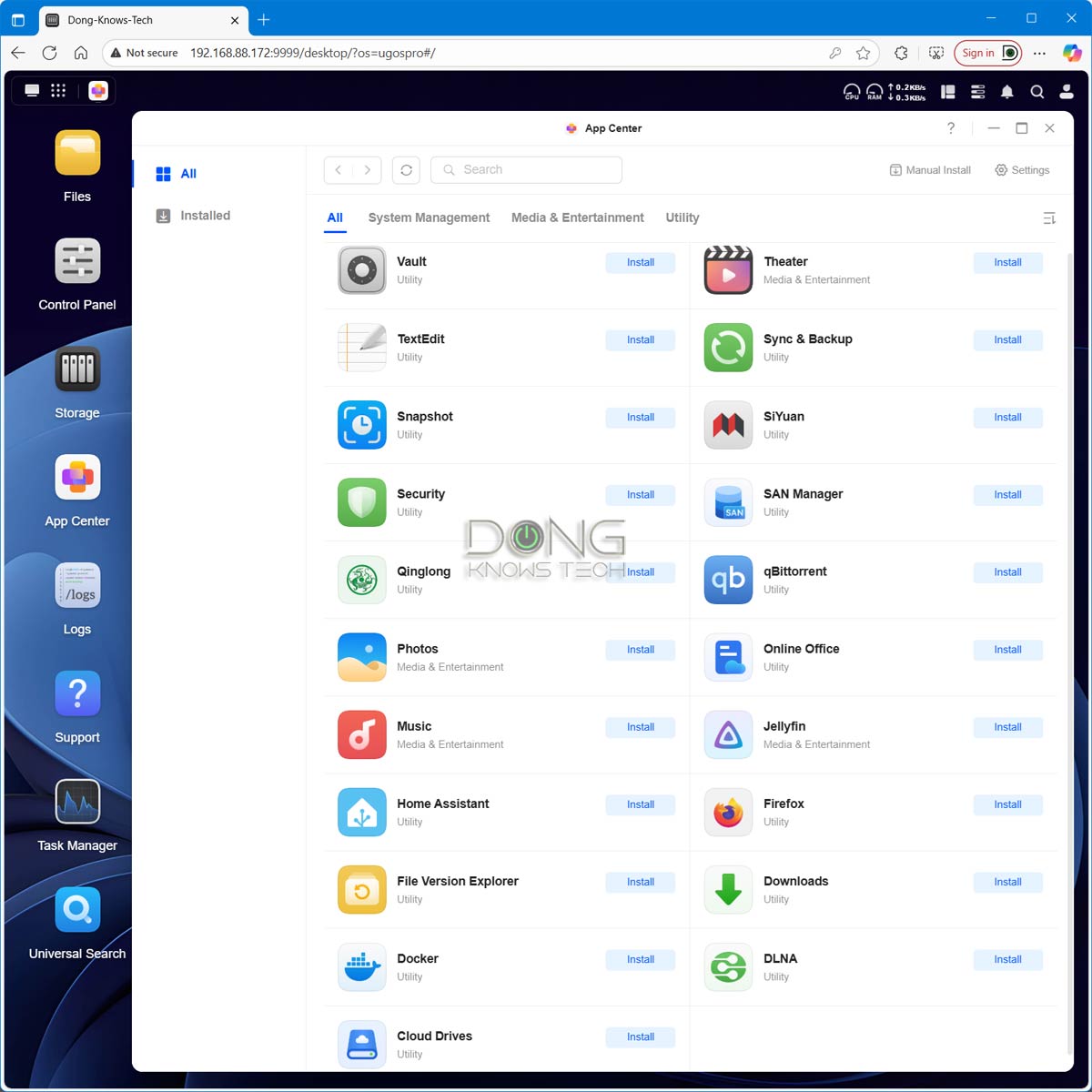
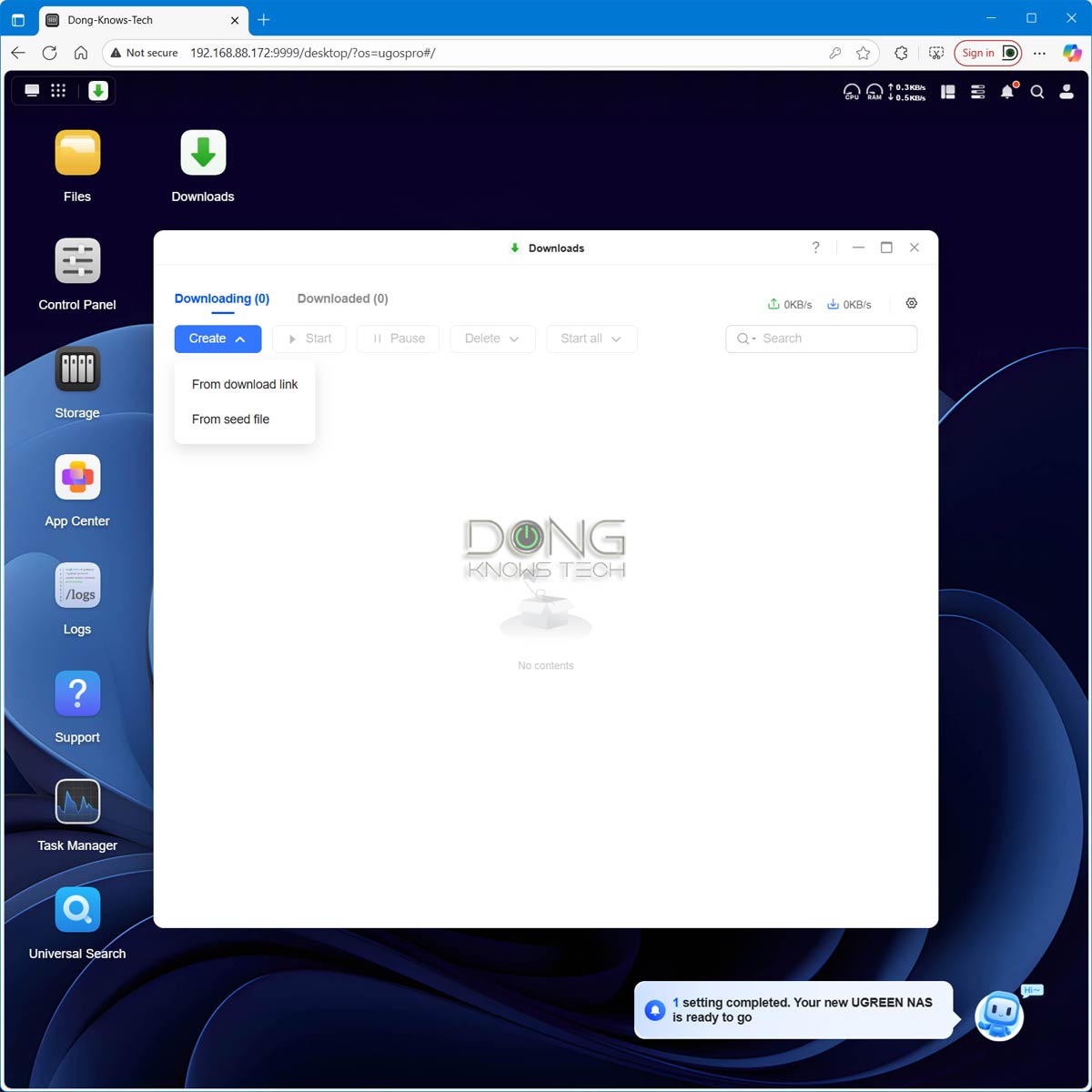
Still, overall, UGOS Pro has enough to meet the needs of most home users, and advanced users can get more via the Docker app. Additionally, the lack of depth can be beneficial in some instances, as it keeps things clean. Hopefully, things will continue to improve in the world of UGREEN NAS, which has proved to be quite impressive considering its young age—the whole thing started just over a year ago on March 26, 2024.
UGREEN NASync DH4300 Plus: Excellent for the money
I tested the UGREEN NASync DH4300 Plus for over a week and was happy with its performance. Although it wasn’t the fastest and was actually slower than the DS925+ by a small margin, it was close to what one could expect from its 2.5Gbps port with sustained data rates up to 280MB/s (2.2Gbps).
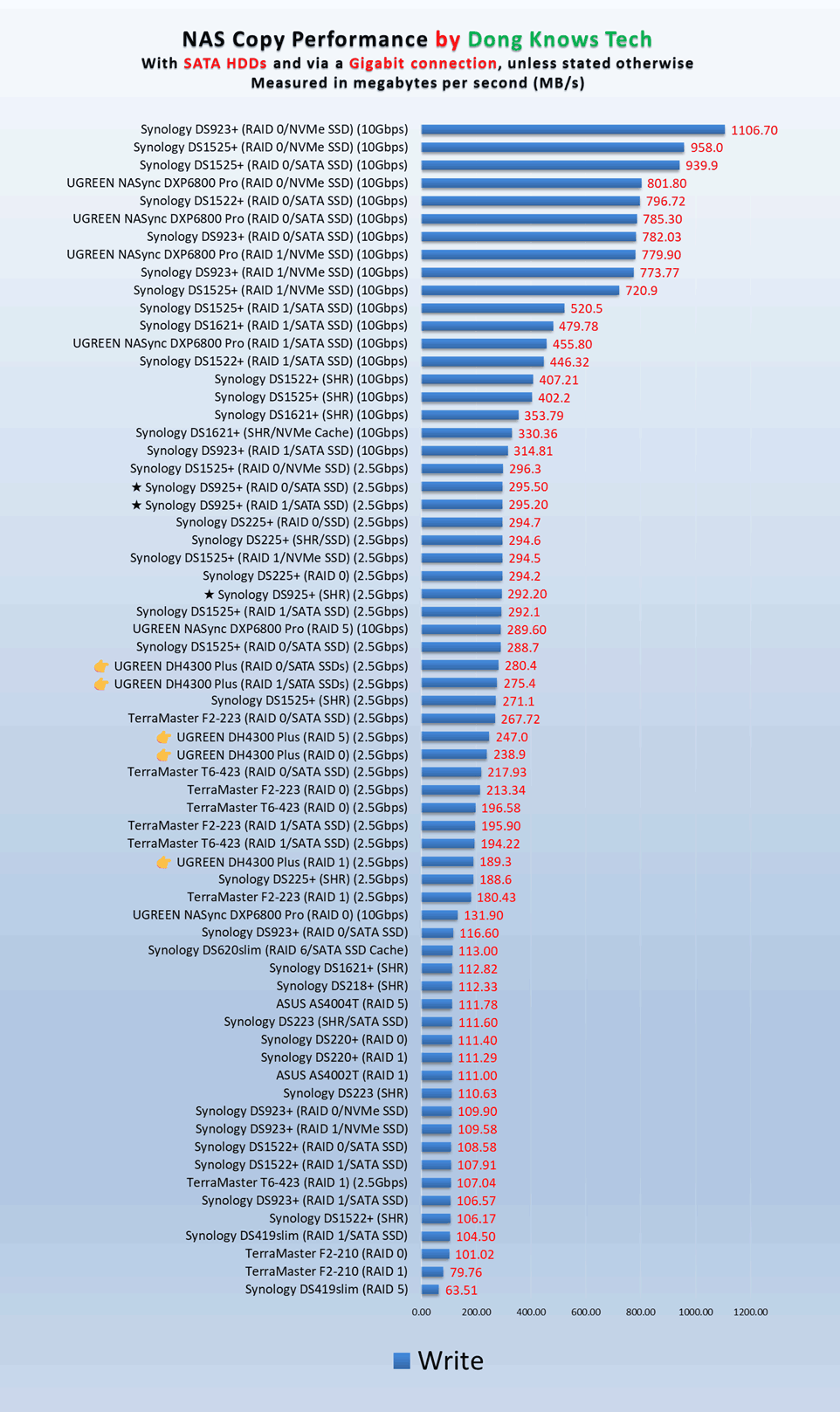
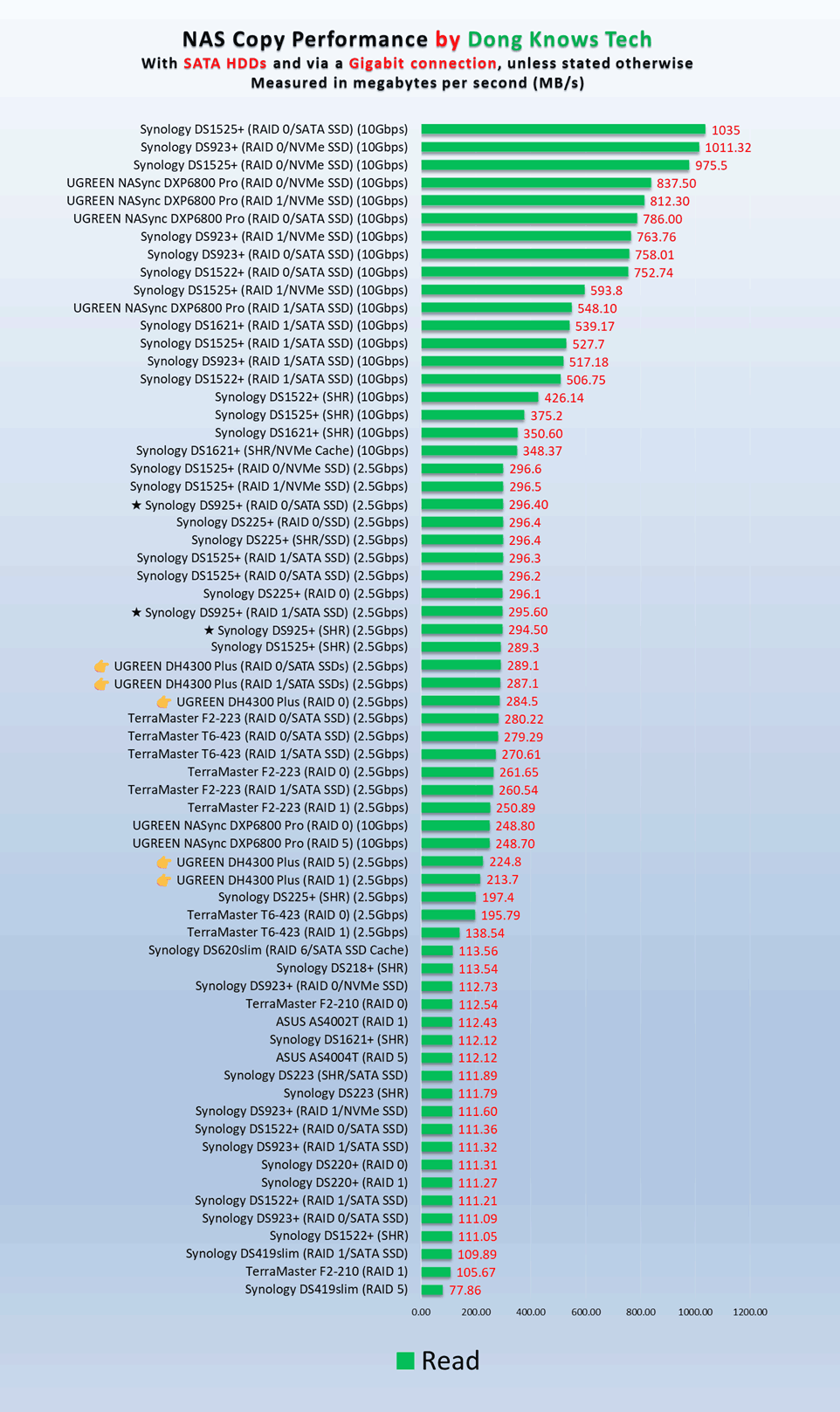
The server worked without any hiccup during my trial and was completely quiet most of the time—its internal fan revved up briefly during boot time and remained silent afterward. It never became warm either.


It’s worth noting that its web user interface was responsive, likely thanks to the fast flash storage onboard. Apps generally opened instantly, and I could manage multiple open windows with ease. Overall, the UGREEN NASync DH4300 Plus proved to be a pleasure to use.
The UGREEN NASync DH4300 Plus' Rating
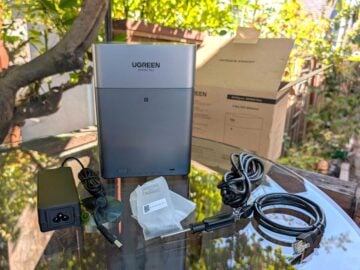
Pros
Simple design with a 2.5Gbps port, plenty of processing power, and four drive bays, affordable
Responsive and robust UGOS Pro operating system with standard management, functions, and add-on apps, including built-in support for shadow copies, and Domain/LDAP
Runs cool and quiet
Cons
Require many screws for drive installation, loose top cover
App Center lacks popular apps, such as Plex Media Server or IP camera support; no flexible RAID, slow RAID build time
Zero upgradability, no NVMe support, no virtual machine support
Conclusion
The UGREEN NASync DH4300 Plus has an excellent combo of cost, performance, and features. If you’re looking for a just-right NAS server for a home or even a small office with no need for virtual machine support, it’s a great deal. Get one today!



Thank you for this review- I have been looking at upgrading an older synology 212j and the 4 bay synology models I have been looking at are surprisingly more expensive than the same models were two years ago. This looks like a better option– or at least more affordable one for my needs. I was hoping you might offer some advice on a potential upgrade-
I currently have two 4tb drives that are set up as synology hybrid raid in the 212j that I would consider migrating to this UGREEN NAS. Would this be possible or would I have to change the format of my current drives? (I think this is what I would have to do– just hoping that I don’t- and I am not even sure its possible)
I know that this is probably a dumb question but I can only wrap my head around so many things as I age and I haven’t even thought about my synology set up since I build it 13 years ago– it just works.
You can only migrate if you use another Synology server, James. What you can do is get this one with two drives, set them up as RAID 1, copy your data over from the current server then move the two old drives over and add them (as though they were new drives) to the existing volume by changing it to RAID5. The system will change the RAID setup, extend the storage space while keeping existing data. It’s a long process but it works. Good luck!